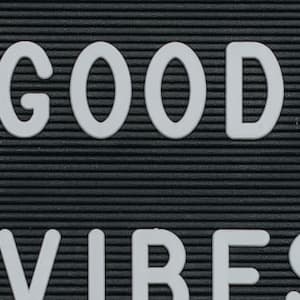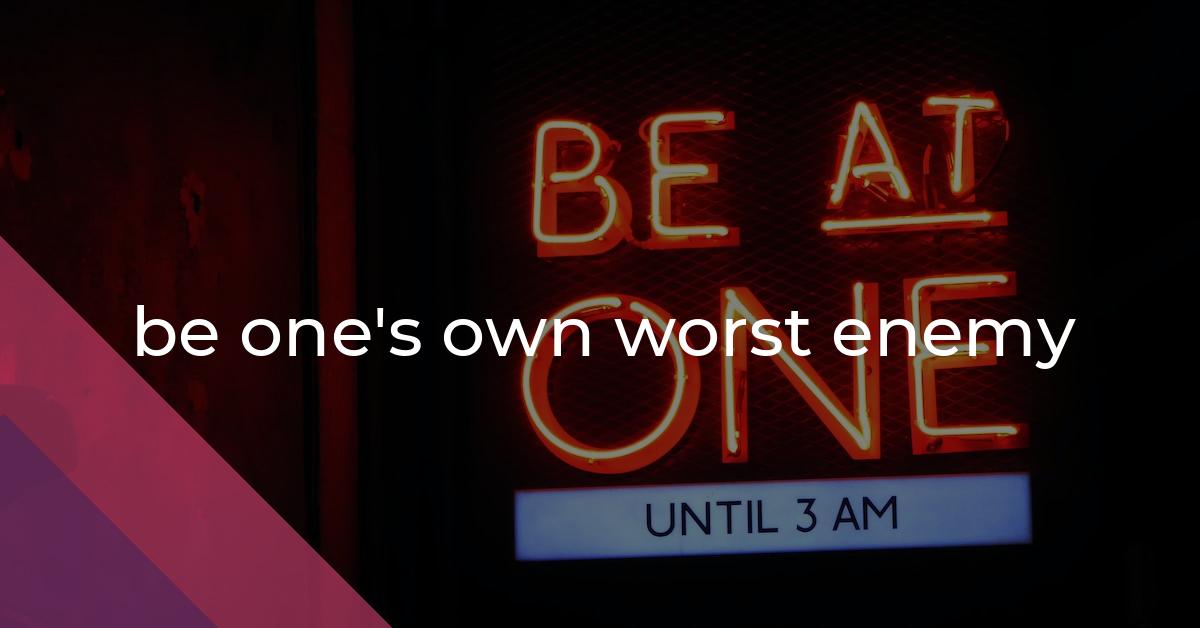be one’s own worst enemy: Idiom Meaning and Origin
What does ‘be one's own worst enemy’ mean?
The idiom "be one's own worst enemy" means to act or behave in a way that undermines one's own success or well-being. It refers to being self-destructive or self-sabotaging, often due to negative habits, attitudes, or actions.

Idiom Explorer
The idiom "stand in one's own light" means to do something that hinders or harms one's own progress, success, or reputation.
The idiom "in one's own little way" means to contribute or make a difference, even if it is small or insignificant, according to an individual's own capabilities or circumstances.
The idiom "hold one's own" means to be able to compete or perform adequately in a given situation, often against strong opponents or in challenging circumstances.
The idiom "hoist by one's own petard" means to be harmed or defeated by one's own actions or plans. It originates from a quote by Shakespeare's Hamlet, where a petard is a small explosive device that can blow up the person who set it.
The idiom "have one's back up" means to become defensive or angry due to feeling threatened or criticized.
The idiom "go one's own way" means to make independent choices or decisions, without being influenced by others or conforming to societal expectations.
The idiom "get one's fingers burnt" means to suffer negative consequences or experience a setback due to one's own actions or decisions. It implies getting physically or metaphorically hurt or harmed as a result of taking a risk or involving oneself in a dangerous or risky situation.
The idiom "forget oneself" means to lose control of one's emotions or behavior, usually in a way that is unusual or inappropriate for the situation.
The idiom "fight one's corner" means to defend oneself or stand up for one's own beliefs, ideas, or rights, especially when facing opposition or criticism.
The idiom "eat one's own" means to act selfishly or prioritize one's own needs or interests above others, often to the detriment of others or the overall goal.
Self-Defeating Disasters
The idiom "be one's own worst enemy" is a common expression used to describe someone who consistently sabotages their own success. This idiom implies that the individual's actions or choices harm their own personal or professional advancement.
The exact origins of this idiom are unknown, but it is believed to have originated from the broader concept of self-sabotage, which has been observed throughout history and across cultures.
Individuals who are their own worst enemies often engage in behaviors such as procrastination, self-doubt, or making choices contrary to their long-term goals. This self-sabotaging behavior can appear in various aspects of life, including personal relationships, careers, or personal growth.
This idiom is often used to describe individuals who consistently repeat negative patterns or make decisions detrimental to their own well-being. It encompasses self-defeating behaviors such as excessive self-criticism, refusing help or support, clinging to unhealthy habits, and prioritizing short-term gratification over long-term success.
Being one's own worst enemy is not an inherent personality trait but rather a behavioral pattern that can be changed with self-awareness and effort. Understanding and acknowledging the underlying factors contributing to self-sabotage is crucial for breaking free from this cycle.
While this idiomatic phrase does not offer a specific solution for overcoming self-sabotaging tendencies, it serves as a reminder of the power of self-reflection and personal growth. By identifying and addressing the root causes of self-destructive behavior, individuals can take steps towards becoming their own allies and achieving their goals.
Another idiom related to being one's own worst enemy is "stand in one's own light." This idiom refers to someone hindering their own progress or success by their own actions or choices. It suggests that individuals can unintentionally create obstacles for themselves, preventing them from reaching their full potential.
Similarly, the idiom "eat one's own" can also be related to being one's own worst enemy. This expression implies that individuals are causing harm to themselves or undermining their own interests. It suggests that individuals are acting against their own self-interests, leading to negative consequences.
Closely connected to the idiom "be one's own worst enemy" is the expression "cut off one's nose to spite one's face." This idiom conveys the idea of someone taking action that may initially seem satisfying or retaliatory but ultimately harms themselves. It highlights the irrationality and self-destructive nature of making choices out of spite or revenge.
The phrase "dig one's own grave" is also related to being one's own worst enemy. This idiom suggests that individuals are unknowingly doing things that will inevitably lead to their own downfall or failure. It highlights the long-term consequences of self-sabotaging behavior and the harmful effects individuals can have on their own lives.
By exploring these related idioms, it becomes clear that being one's own worst enemy is a pervasive concept that spans across various expressions. It reflects the idea that individuals can hinder their own progress or success through self-sabotaging behaviors and choices. However, it is important to recognize that these patterns can be changed through self-awareness, personal growth, and a commitment to breaking free from negative cycles.
Example usage
Examples of how the idiom "be one's own worst enemy" can be used in a sentence:
- She always procrastinates and never finishes her work on time, she is definitely her own worst enemy.
- John had the opportunity to succeed, but his bad temper and impulsive decisions proved to be his own worst enemy.
- Despite being talented, his lack of self-confidence and constant self-doubt have made him his own worst enemy in pursuing his dreams.
More "Self" idioms



